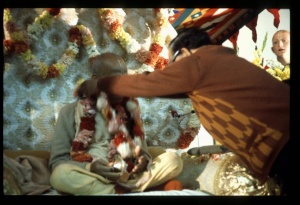CC Adi 10.50 (1975)

A.C. Bhaktivedanta Swami Prabhupada
Below is the 1996 edition text, ready to be substituted with the 1975 one using the compile form.
TEXT 50
- pratigraha nāhi kare, nā laya kāra dhana
- ātma-vṛtti kari’ kare kuṭumba bharaṇa
SYNONYMS
pratigraha nāhi kare—he did not accept charity from anyone; nā—not; laya—take; kāra—anyone’s; dhana—wealth; ātma-vṛtti—own profession; kari’—executing; kare—maintained; kuṭumba—family; bharaṇa—provision.
TRANSLATION
Śrīla Murāri Gupta never accepted charity from friends, nor did he accept money from anyone. He practiced as a physician and maintained his family with his earnings.
PURPORT
It should be noted that a gṛhastha (householder) must not make his livelihood by begging from anyone. Every householder of the higher castes should engage himself in his own occupational duty as a brāhmaṇa, kṣatriya or vaiśya, but he should not engage in the service of others, for this is the duty of a śūdra. One should simply accept whatever he earns by his own profession. The engagements of a brāhmaṇa are yajana, yājana, paṭhana, pāṭhana, dāna and pratigraha. A brāhmaṇa should be a worshiper of Viṣṇu, and he should also instruct others how to worship Him. A kṣatriya can become a landholder and earn his livelihood by levying taxes or collecting rent from tenants. A vaiśya can accept agriculture or general trade as an occupational duty. Since Murāri Gupta was born in a physician’s family (vaidya-vaṁśa), he practiced as a physician, and with whatever income he earned he maintained his family. As stated in Śrīmad-Bhāgavatam, everyone should try to satisfy the Supreme Personality of Godhead through the execution of his occupational duty. That is the perfection of life. This system is called daivī-varṇāśrama. Murāri Gupta was an ideal gṛhastha, for he was a great devotee of Lord Rāmacandra and Caitanya Mahāprabhu. By practicing as a physician he maintained his family and at the same time satisfied Lord Caitanya to the best of his ability. This is the ideal of householder life.